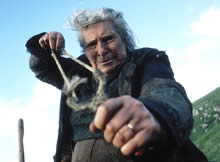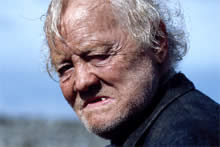| 
"I've always loved the idea of this omnipresent, animalistic qualities to be out in the landscape. If you've spent long periods of time alone in the outdoors, within a day or two, this humility seeps into you. Without meaning to sound too New Age mumbo jumbo, there is an element of very naturalistic force at work that us as city dwellers just touch on." Far from making formulaic films, Kotting let the naturalistic force that he felt around him shape the way in which This Filthy Earth was made. As a result, he views the film as an entity that he helped create which inevitably has imperfections. "I see it for all the mistakes, all the problems, inconsistencies, and insecurities that are manifest on the screen. I accept that the thing I'm going to be doing is going to be flawed, but that within those flaws, that organic mass, are moments that work brilliantly. I'm not aspiring to be a mainstream filmmaker - it's more like sculpture - the way I deal with sound and image is not that stereotypical. I accept the film for what it is and re-editing and re-shooting if anything will make it worse. It's always an approximation of what I want, a contingent. I don't feel I could sustain that sort of focus for a year of my life just to produce something where I knew what it was going to look like in the beginning - just a product. OK, This Filthy Earth is a product too, but it's a berserk and psychotic product. It's hard to grab hold of it - it'll fall out your hands, kick you in the bollocks." 
Despite his incredible creative input, Kotting is quick to acknowledge the contribution of his friend and co-writer, the stand-up comedian Sean Lock. "I knew that I didn't have it in me to sit down and write a feature length script - I would rather be making pieces of work . Sean brought a lot of humour to script, and a lot of it is very dense, very black - it's a slog, it's an endurance test. Within that mire there are these beautiful beacons of humour which is very much what Sean's about - very absurdist, very cerebral, very visceral. His writing has just got better and better and better, whereas my filmmaking is getting worse and worse and worse." This self-deprecation aside, Kotting feels that he has a duty to create something original, a film that will change people’s perception of cinema. "If an auditorium has eight people in it and it affects one of those eight people in a way that other films don't, transports them to a place they haven't been before in terms of cinema, then I’ve succeeded. To this day both critics and individuals are coming back to me about Gallivant, telling me that it really changed the way that they thought about film. I look at it as viral: I insert a little virus into the mainstream, and perhaps that virus might spread and that people will become affected - infected - by that. I feel aesthetically and philosophically and artistically more fulfilled doing what I do best instead of making a piece of mainstream cinema. I'm just not interested in that kind of thing." Indeed, Kotting is the antithesis of the mundane nature of the mainstream. I cautiously suggests that more than just a filmmaker, he is an artist. "If you describe yourself as an artist, a lot of people balk at you. It's a bad word. Audiences say 'Fuck that, I'm not even going to think about this film'. I use film as a medium in the same way that I might use sound or installation or performance. Most of my inspiration and points of reference for this film come from the world of art. It just so happens that that's what turns me on, that's what inspires me. "I sometimes think that maybe in five years’ time what I would rather be doing is making work specifically for galleries. For the audience, it's more transient. If you want to enter into that world, a space you haven't been in before, that's up to you. I sometimes feel sorry for an audience that sit down to see one of my films and after ten minutes think 'I can't stand this - I've got to get out', whereas if it was a gallery space, they could fuck off straight away." This Filthy Earth is such a rich experience, a film which so fully conveys the beauty and brutality of the countryside, that it is difficult to understand why anyone would want to leave one of Andrew Kotting’s film. Kotting himself is a compelling personality, a man who speaks harsh fluid poetry, speaks with real fire and means every word that he says. I notice that Kotting pronounces ‘theatre’ the way a classical actor would, but uses the word ‘fuck’ without it seeming false or like he’s doing it to shock you. He seems entirely relaxed sitting next to me in urban surroundings, but yearns to get back to his beloved Pyrenees. He is someone who transcends class, belongs both in the town and the city, and produces highly original, quasi-experimental work within the system. In him is a dangerous, unstable balance of things that simply don’t belong together, yet belonging nowhere and everywhere allows him to produce masterful, uncompromising art. 
"There's a plethora of shit out there", says Kotting, "but within that shit there are wonderful nuggets of the sublime." He is one of those creators of the sublime, too long left uncelebrated. Andrew Kotting is taking British cinema to new and exciting places — follow him.
This Filthy Earth is released in the UK on November 2
|